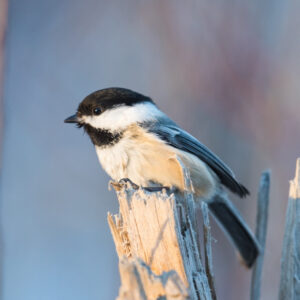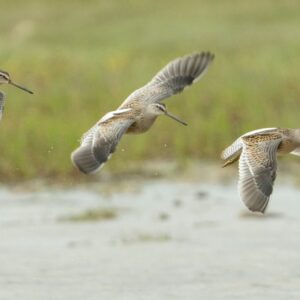Global Warning – BirdLife’s 5 asks for Copenhagen
Global Warning – BirdLife’s 5 asks for Copenhagen
 Ivory Gull © Judith Blakeley |
December 7, 2009 – BirdLife is the world’s largest network of conservation organisations, and Nature Canada is the BirdLife co-partner, with Bird Studies Canada, in Canada. BirdLife Partners from 19 countries are currently in Copenhagen working to ensure that a new deal is agreed that will tackle the global threats posed by climate change to people and nature.
“The BirdLife Partnership are asking the world’s leaders to agree concrete targets in Copenhagen over the next two weeks to reduce greenhouse gas emissions,” said Melanie Heath – Senior Advisor on Climate Change at BirdLife.
Today marks the start of the United Nations Climate Change Conference in Copenhagen where Governments are meeting to agree on action to tackle climate change. It is critical that a new global climate change deal is agreed before it’s too late.
In the last century the Earth’s surface temperature has risen by an average of 0.74°C. Temperature rises beyond 2°C are predicted to lead to catastrophic effects on nature, people and the global economy. “Climate change is happening,” added Melanie Heath. “In some places the average temperature has already risen well above the 2°C threshold. There is a window between now and 2015 within which it may be possible to significantly slow down or lower the expected increases in global temperatures.”
Climate change impacts including drought, crop failure, flooding, sea-level rise, and extreme weather events are already being felt across the world, with the poorest people and most vulnerable ecosystems hit hardest. Plant and animal ranges are already shifting poleward and upward, and studies suggest many species will not be able to keep up with their changing climate space.
“BirdLife believes it is essential that the Copenhagen outcomes recognise the vital importance of safeguarding biodiversity, ecosystems and the essential services they provide in climate change adaptation and mitigation,” said Melanie Heath.
Healthy, bio-diverse environments play a vital role in maintaining and increasing resilience to climate change and helping to mitigate its effects. By conserving habitats rich in carbon, such as forests and peatlands, we can ensure that carbon remains stored in these ecosystems and also continues to be sequestered from the atmosphere.
Healthy ecosystems also play a vital role in climate change adaptation through protecting the natural resource base, providing alternative livelihood options, and maintaining resilience to future climate.
BirdLife has joined a consortium of around 500 environment and development NGOs, the Climate Action Network, which is working to limit climate change to sustainable levels and is calling for a fair, ambitious and binding deal in Copenhagen.
The BirdLife Partnership believes any global deal agreed in Copenhagen must address our 5 actions as follows:
1. Cut global emissions by the amount needed to limit global average temperature rises to less than 2°C above pre-industrial levels.Developed countries should take the lead in cutting emissions, but rapidly industrialising developing nations must act too. Global emissions must peak and decline well before 2020, and go to 80% below 1990 levels by 2050. Industrialised countries must take on targets of 40% reductions below 1990 levels by 2020.
2. Recognise the vital importance of safeguarding biodiversity, ecosystems and the essential services they provide in climate change mitigation, in particular, reducing emissions from deforestation and degradation (REDD). Tropical deforestation accounts for 15-20% of all human-induced emissions, and must be reduced to zero by 2020. REDD should prioritise conservation of natural tropical forests because they are the most carbon dense, and must exclude conversion of natural forests to industrial forests or plantations. REDD must include provisions which ensure conservation of biodiversity because it is the plants and animals in natural forests that help create their carbon density. REDD must respect, support and promote the rights of local and indigenous peoples.
3. Recognise the vital importance of safeguarding biodiversity, ecosystems and the essential services they provide in climate change adaptation. Healthy bio-diverse environments play a vital role in maintaining and increasing resilience to climate change. Copenhagen outcomes should encompass taking an ecosystem approach to all adaptation, should refer to the direct use of ecosystems as part of a strategy to help people adapt to the adverse effects of climate change, and should recognise vulnerable ecosystems as a priority concern.
4. Provide funding for developing countries to reduce emissions from deforestation, enable adaptation to climate change, and support low-carbon development. At least $200 billion will be needed annually by 2020, including $35 billion for REDD, and $100 billion to enable developing countries to adapt to the inevitable impacts of climate change.
5. Ensure that when developed countries account for their land-use sectors they account fully for carbon emissions to, and removals from, the atmosphere. Current rules enable countries to hide emissions whilst claiming credit for carbon storage, and the rules proposed in Copenhagen are shaping up to be even worse than the old ones.
-30-



